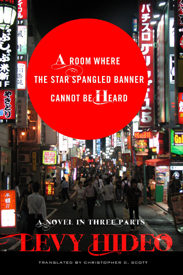A translation of Levy Hideo’s A Room Where the Star-Spangled Banner Cannot Be Heard (Seijoki no kikoenai heya, 1992) has recently been published by Columbia University Press. As the first work of fiction written in Japanese by a white American author, this novel will be of interest to scholars and students of Japanese literature and culture, minorities in Japan, U.S.-Japan relations, and transnational or diasporic identities.
**********
A Room Where the Star-Spangled Banner Cannot Be Heard: A Novel in Three Parts
By Levy Hideo
Translated, with an introduction, by Christopher D. Scott
Columbia University Press, 2011
ISBN: 978-0-231-15744-5
Description:
 Set against the political and social upheavals of the 1960s, A Room Where the Star-Spangled Banner Cannot Be Heard tells the story of Ben Isaac, a blond-haired, blue-eyed American youth living with his father at the American consulate in Yokohama. Chafing against his father’s strict authority and the trappings of an America culture that has grown increasingly remote, Ben flees home to live with Ando, his Japanese friend. Refusing to speak English with Ben, Ando shows the young American the way to Shinjuku, the epicenter of Japan’s countercultural movement and the closest Ben has ever felt to home.
Set against the political and social upheavals of the 1960s, A Room Where the Star-Spangled Banner Cannot Be Heard tells the story of Ben Isaac, a blond-haired, blue-eyed American youth living with his father at the American consulate in Yokohama. Chafing against his father’s strict authority and the trappings of an America culture that has grown increasingly remote, Ben flees home to live with Ando, his Japanese friend. Refusing to speak English with Ben, Ando shows the young American the way to Shinjuku, the epicenter of Japan’s countercultural movement and the closest Ben has ever felt to home.
From the vantage point of a privileged and alienated “outsider” (gaijin), Levy’s narrative, which echoes events in his own life, beautifully captures a heady, eventful moment in Japanese history. It also richly renders the universal struggle to grasp the full contours of one’s identity. Wandering the streets of Shinjuku, Ben can barely decipher the signs around him or make sense of the sounds reaching his ears. Eventually, the symbols and sensations take root, and he becomes one with Japanese language and culture. Through his explorations, Ben breaks free from English and the constraints of being a gaijin. Levy’s coming-of-age novel is an eloquent elegy to a lost time.
Reviews:
“Have we failed to catch the calm but earnest tone that echoes like music through Levy Hideo’s prose? With his unique literary voice, this writer clearly represents a new kind of novelist for Japanese literature. As a superior symbol of mutual understanding between two languages and two nations, this accomplishment surely rivals the work of Masao Miyoshi.” Oe Kenzaburo, author of The Changeling
“A Room Where the Star-Spangled Banner Cannot Be Heard opens up a new frontier in contemporary Japanese exophonic literature for readers in the West. It demystifies the linkage, dear to the Japanese, of a nation to its language. Levy Hideo’s moving exploration of the multilingual, transcultural experiences of the young Ben tells the timeless tale of a boy coming of age in the context of a globalizing world, in which boundaries of language, nationality, and home are blurred.”
Faye Yuan Kleeman, University of Colorado, Boulder
About the Author:
Levy Hideo (Ian Hideo Levy, 1950-) is known as the first white American novelist to write in Japanese. Born to a Jewish American father and a Polish immigrant mother, he became an assistant professor of Japanese literature at Princeton University at twenty-eight. In 1981, he published an English translation of the first five volumes of Japan’s first imperial poetry anthology, Man’yoshu (Collection of Ten Thousand Leaves), for which he won a National Book Award for Translation. Now based in Tokyo, he travels frequently to the United States and China in connection with his writing.
About the Translator:
Christopher D. Scott was born in the United States but attended high school in Japan. He received his B.A. from Princeton University and his Ph.D. from Stanford University. He is an assistant professor of Japanese and Japanese literature at Macalester College.
For more information, see the publisher’s website:
http://cup.columbia.edu/book/978-0-231-15744-5/a-room-where-the-starspangled-banner-cannot-be-heard
